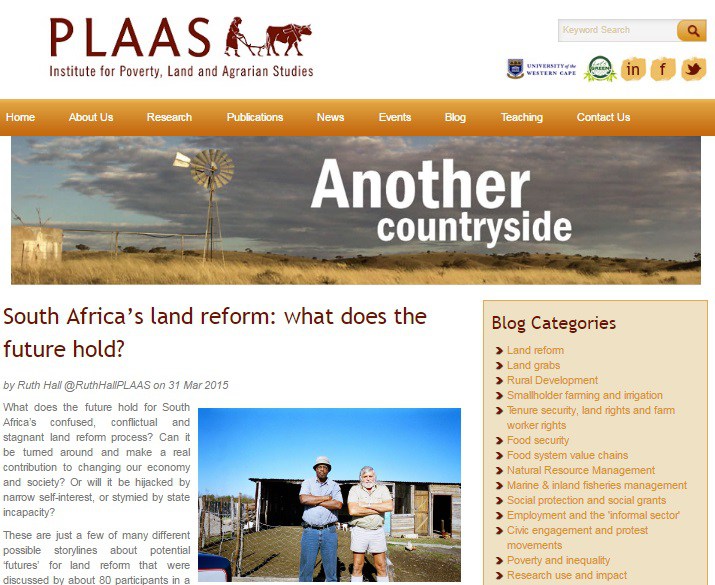Focal point
Location
PLAAS was founded in 1995 as a specialist unit in the School of Government, Economic and Management Sciences Faculty at the University of the Western Cape (UWC), Cape Town. Since then, PLAAS has developed a proven track record of undertaking high-quality research on land and agrarian reform, poverty, and natural resource management in South Africa and the southern African region.
Besides research and postgraduate teaching, PLAAS undertakes training, provides advisory, facilitation and evaluation services and is active in the field of national policy development. Through these activities, and by seeking to apply the tools of critical scholarship to questions of policy and practice, we seek to develop new knowledge and fresh approaches to the transformation of society in southern Africa.
Resources
Displaying 11 - 15 of 54South Africa’s land reform: what does the future hold?
What does the future hold for South Africa’s confused, conflictual and stagnant land reform process? Can it be turned around and make a real contribution to changing our economy and society? Or will it be hijacked by narrow self-interest, or stymied by state incapacity? These are just a few of many different possible storylines about potential 'futures' for land reform that were discussed by about 80 participants ina meeting to kickstart a scenario planning process for South Africa's land reform,at the Gordon Institute for Business Science (GIBS) in Johannesburg yesterday
What is inclusive agricultural growth? Agricultural investment, productivity and land rights in the context of large-scale investments
Reflections following the passing of the African Union’s Guiding Principles on Large-Scale Land-Based Investment, the culmination of policy processes over the past decade. Rising food prices reflect the systematic neglect of agriculture over a long period. We need indicators and monitoring, cannot rely on technology to resolve political problems, need a system-wide approach and to create opportunities for young people to build livelihoods in farming and throughout the agro-food system.
Land Rights Monitors and the Struggle for Land Rights in Agricultural Investment Areas
To ensure that there is sustainability at the community level in its land rights and governance training programme, Land Rights Research and Resources Institute (HAKIARDHI), a Tanzanian national level organization that spearheads land rights of small-scale producers, uses land rights monitors (LRMs) in its program areas. In each of the selected villages of the program districts, two LRMs (a man and a woman) who have received land rights training from HAKIARDHI are democratically elected by villagers.
Land Rights Monitors and the Struggle for Land Rights in Agricultural Investment Areas
To ensure that there is sustainability at the community level in its land rights and governance training programme, Land Rights Research and Resources Institute (HAKIARDHI), a Tanzanian national level organization that spearheads land rights of small-scale producers, uses land rights monitors (LRMs) in its program areas. In each of the selected villages of the program districts, two LRMs (a man and a woman) who have received land rights training from HAKIARDHI are democratically elected by villagers.
Land Rights Monitors and the Struggle for Land Rights in Agricultural Investment Areas
To ensure that there is sustainability at the community level in its land rights and governance training programme, Land Rights Research and Resources Institute (HAKIARDHI), a Tanzanian national level organization that spearheads land rights of small-scale producers, uses land rights monitors (LRMs) in its program areas. In each of the selected villages of the program districts, two LRMs (a man and a woman) who have received land rights training from HAKIARDHI are democratically elected by villagers.





